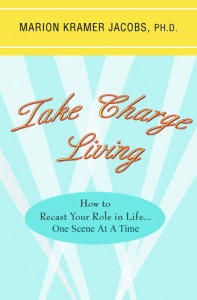
The bad: first off, though the book is represented by a PR firm, the character is decidedly unprofessional. It has that blurred effect that is common to some self-published printing. This is surprising, as the book is part of iUniverse’s Star program – which requires that the book is an “Editor’s Choice,” “Reader’s Choice,” and has sold more than 500 copies. Even though the book is designated as iUniverse Star on the back, I would recommend that the author use an independent printer or publish with a totally unique printer, without the iUniverse designation, because your average reviewer is likely not going to know the difference between iUniverse or iUniverse star.
Additionally, there are some editing problems, especially in the introduction. Any time the title is mentioned in the introduction – which is several times – it is written as Take-Charge Living: How to Recast Your Role in Life…One Scene At a Time Acts. An extra “Acts.” Not a huge deal, but with a self-help book you want to instill a sense of confidence and professionalism, and this is not a great mark out of the starting gate.
The good: The book is professionally written overall – despite those hiccups. The write is a clinical psychologist and professor of psychology at UCLA, which means the book has a sense of authority. There are also enormously impressive quotes from other psychologists, likely her immediate colleagues:
Take-Charge Living is a remarkable book that provides a clearly presented set of effective strategies to guide one’s journey into fulfillment and meaningful relationships with others…”
Joseph L. White Ph.D.
Unfortunately, the book does not pose a usable list of techniques to tackle self-help issues. A lot of it feels like a prelude in which you’re waiting for the actual step by step guide. An example:
Feelings can be your friends, but they can also be your enemy. Knowing when to follow your feelings and when to say “no thanks” to them is critical. One of the most important things this book teaches is not only how to understand the connection between reason and emotions, but more importantly, what to do when reason and emotions (feelings) pull you in opposite directions.
A lot of this information is well-conveyed, but doesn’t provide a lot of usable information beyond, “Don’t do that.” The book is best when it’s goes through the doctor’s patients’ individual stories, which inspires empathy. It’s good to read other people’s cases who may be suffering from similar problems. But it diagnoses without providing too many direct solutions.
A book like Feeling Good by David Burns contains a lot more insight into how people react to certain situations. That may be an unfair comparison, because the book is arguably the best self-help book ever written, but you come away from that book with more solutions to a greater degree of problems. Take-Charge Living is more like self-esteem 101: by all means, this book could be helpful to people, but I could see some people reading the book and thinking, “OK, I know I’ve got problems. Now what?”
Author site: www.takechargeliving.com
Get an Editorial Review | Get Amazon Sales & Reviews | Get Edited | Get Beta Readers | Enter the SPR Book Awards | Other Marketing Services






















Funny thing about the “star” designation. It costs more to get. That is, you have to pay to get editors to read it to give it that classification. So even if your book is better than a “star” labeled book, it won’t get that rating if you don’t have the money to pay for it.